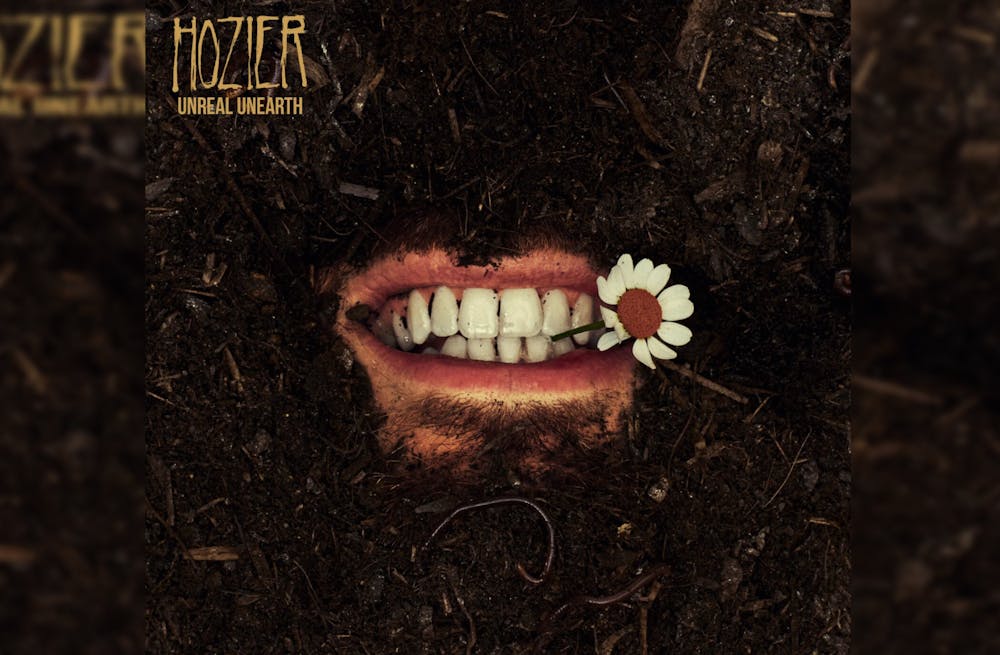Singer-songwriter Andrew Hozier-Byrne’s third studio album is a profound and poetic display of human emotion. Taking inspiration from literature, mythology and religion, “Unreal Unearth” is a soulful and romantic behemoth of reflection on love, faith and humanity.
Hozier told Entertainment Weekly he began his work on the album throughout the height of the COVID-19 pandemic as a way to make sense of the events happening around him and serve as a vehicle of reflection. Similar to his previous works, Hozier masterfully blends elements of folk, blues, rock and Irish sensibilities into one cohesive work of musical poetry on “Unreal Unearth.”
During the pandemic, Hozier was also heavily inspired by Dante’s “Inferno,” the first part of his epic poem “Divine Comedy.” Hozier adopts Dante’s concept of the nine circles of Hell as a framework for “Unreal Unearth,” in which he meditates on notions of sin, love and the unknown in his own descent into darkness.
The opening two tracks, “De Selby (Part 1)” and “De Selby (Part 2),” set the tone for the album as Hozier sings about darkness in oneself. And in taking inspiration from literature, de Selby refers to the main character in Flann O’Brien’s novel “The Third Policeman,” an Irish novel in which the protagonist floats around in the afterlife without realizing he’s dead.
[RELATED: COLUMN: Dorm-friendly recipes you can cook right from your room]
Hozier told Apple Music he felt like de Selby was an appropriate reference as he reflects on the darkness of the infinite space he’s entering. The first track compliments this chilling undertone beautifully, as Hozier’s refrained, warm vocals overline a bed of haunting strings. A touch of subtle fingerpicking allows the heavy lyrics to take root before they transform and a distant choir sings in Irish on the outro.
As Hozier begins his descent into Hell, he examines the idea of being stuck in a sort of limbo on “First Time.” A lush and textured buildup of strings underscore the feeling of collapse as Hozier sings “This life lived mostly underground / Unknowin' neither sight nor sound / 'Til reachin' up for sunlight just to be ripped out by the stem.”
As “Unreal Unearth” progresses, Hozier dives headfirst into sin. On “Francesca,” he references Dante’s second circle of Hell with an ode to lust. With breathy vocals and a sultry organ, “Francesa” relates to the tragic love story of Francesca da Rimini, whose husband killed her after he found her having an affair with his brother. Rather than condemn the sin of lust, though, Hozier commends it as he sings about the beauty of endurance when challenges in love arise.
[RELATED: COLUMN: Review Roundup: Songs from Bloomington’s summer]
Although deeply lyrical, “Unreal Unearth” also features a lovely, symphonic instrumental track. “Son of Nyx” represents Dante’s first steps toward the light on his journey through Hell. Hozier draws from mythology, too, as the track references the Greek goddess of night and her son, Charon, who ferries souls across the Styx and Acheron rivers into Hell. The track is cinematic, as its orchestral texture evokes feelings of sadness and hope.
The final track, “First Light,” alludes to the end of Dante’s odyssey throughout “Divine Comedy,” and remarks at the relief of seeing the sky again after suffering in the dark. “First Light” is drenched in excitement and hope, as the rich timbre of Hozier’s honey-smooth voice wraps listeners in a warm hug. It’s comforting to know you can make it out of Hell and end up in Heaven.
In the end, “Unreal Unearth” leaves listeners hopeful. Hozier’s foray into the underworld serves as an evocative and timeless reflection upon humanity. After a painstakingly long yet mesmerizing journey through Hell, there is still light and goodness in the world.




